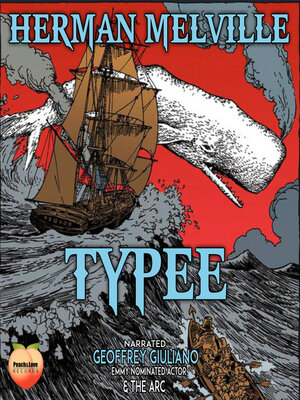
Sign up to save your library
With an OverDrive account, you can save your favorite libraries for at-a-glance information about availability. Find out more about OverDrive accounts.
Find this title in Libby, the library reading app by OverDrive.



Search for a digital library with this title
Title found at these libraries:
| Library Name | Distance |
|---|---|
| Loading... |
"Typee" is a novel written by Herman Melville and published in 1846. It is partly based on Melville's own experiences as a sailor and his brief stay in the Marquesas Islands in the South Pacific. The novel follows the adventures of Tommo, the narrator, who jumps ship with his companion Toby and finds themselves living among the Typee people, a Polynesian tribe known for their reputed cannibalism.
"Typee" offers a fictionalized account of the time Melville spent living with the Typee tribe, providing vivid descriptions of the landscape, customs, and rituals of the people he encountered. The novel presents a contrast between the seemingly idyllic and harmonious life of the Typee and the harsh realities of Western civilization. Melville explores themes of cultural encounter, colonialism, and the clash between primitive and civilized societies.
Throughout the novel, Melville reflects on the inherent biases and misunderstandings that arise when encountering different cultures. He challenges prevailing stereotypes and offers a more nuanced portrayal of the Typee people, depicting them as complex and fully realized characters rather than exoticized caricatures. The novel raises questions about the nature of civilization, the impact of colonialism on indigenous peoples, and the tensions between individual freedom and societal norms.
"Typee" garnered significant attention upon its publication, captivating readers with its adventurous narrative and its exploration of the exotic and unfamiliar. The novel contributed to the growing interest in the South Pacific and its cultures during the 19th century, influencing subsequent literary works and travel writing. While "Typee" is often overshadowed by Melville's later and more renowned works, such as "Moby-Dick," it remains an important early work in his career and a fascinating exploration of cultural encounters and human nature.
"Typee" offers a fictionalized account of the time Melville spent living with the Typee tribe, providing vivid descriptions of the landscape, customs, and rituals of the people he encountered. The novel presents a contrast between the seemingly idyllic and harmonious life of the Typee and the harsh realities of Western civilization. Melville explores themes of cultural encounter, colonialism, and the clash between primitive and civilized societies.
Throughout the novel, Melville reflects on the inherent biases and misunderstandings that arise when encountering different cultures. He challenges prevailing stereotypes and offers a more nuanced portrayal of the Typee people, depicting them as complex and fully realized characters rather than exoticized caricatures. The novel raises questions about the nature of civilization, the impact of colonialism on indigenous peoples, and the tensions between individual freedom and societal norms.
"Typee" garnered significant attention upon its publication, captivating readers with its adventurous narrative and its exploration of the exotic and unfamiliar. The novel contributed to the growing interest in the South Pacific and its cultures during the 19th century, influencing subsequent literary works and travel writing. While "Typee" is often overshadowed by Melville's later and more renowned works, such as "Moby-Dick," it remains an important early work in his career and a fascinating exploration of cultural encounters and human nature.







